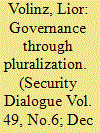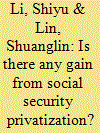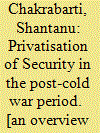|
|
|
Sort Order |
|
|
|
Items / Page
|
|
|
|
|
|
|
| Srl | Item |
| 1 |
ID:
162413


|
|
|
|
|
| Summary/Abstract |
Security responses increasingly involve the delegation of security roles from state actors, such as the police and the military, to a plurality of public and private institutions. This article focuses on the emergence of a modular governance logic in security provision, in which urban security is diffused into differing modules – security actors, performances, technologies and practices – which can be enlisted, deployed, instructed, entwined, detached and withdrawn at will. This article identifies three features of urban modular security provision: the heterogeneity of its public and private components, the development of reserved capacities, and the differential multifacetedness of its performances and practices. These are explored through the case study of East Jerusalem, in which a modular security provision emerged where previously undefined and ad-hoc security arrangements became cohesive, normalized and codified through practice and law. In tracing the flows of security authorities, personnel and knowledge produced within a modular security assemblage, this article proposes that the modular assembly of security actors complements policing institutions by providing other informal disciplinary, punitive and statecrafting powers, in a manner which obfuscates controversial state policies and unequally distributes rights and resources.
|
|
|
|
|
|
|
|
|
|
|
|
|
|
|
|
| 2 |
ID:
106229


|
|
|
|
|
| Publication |
2011.
|
| Summary/Abstract |
Increasing calls for a social security reform of switching from the pay-as-you-go (PAYG) system to a funded system has been seen in recent decades. This paper examines the effect of this reform on capital accumulation and the welfare of each generation. Three methods are used to finance the pension debt, government debt financing, tax financing, and government asset financing. With government debt or tax financing, the market equilibrium remains unchanged and all generations are as well off in the new system as in the PAYG system. Thus, switching from the PAYG system to a funded system is neutral. With government asset financing, the interest rate will decrease, private capital will increase, but the total output may either increase or decrease. The welfare effect is also ambiguous in general, depending on the rate of return of government assets. With plausible parameters, our simulation shows that the reform will lower the interest rate, increase private capital, and lower government capital in the short run, but raise government capital and increase output in the long run.
|
|
|
|
|
|
|
|
|
|
|
|
|
|
|
|
| 3 |
ID:
106434


|
|
|
|
|
| Publication |
2011.
|
| Summary/Abstract |
An increase in the use of private military and security contractors over the last two decades has sparked a debate over whether their employment enhances or detracts from government control of its security agents. Although there is a rich literature on civilian control of military agents, there is still disagreement on the operationalization of control, and there has been little attempt to apply these theories to private actors. This article contributes to both discussions by offering a synthesis of theories of control and comparing features specific to public versus private agents that may affect control. The author offers the hypothesis that the principles of democratic governance are likely to be more secure when policy is carried out by public agents.
|
|
|
|
|
|
|
|
|
|
|
|
|
|
|
|
| 4 |
ID:
127057


|
|
|
|
|
| Publication |
2013.
|
| Summary/Abstract |
This study draws upon the insights of Michel Foucault to examine the contemporary immigration industrial complex in the United States. We focus on the involvement of private prison corporations in this complex, as well as the factors that have been essential to its creation and that perpetuate its continuance. We argue that four key aspects of the system (the legal apparatus, worldviews/ideas, private corporations, and webs of influence) converge to create an immigration industrial complex and that this complex functions as an economy of power that works to manage the existing system and discourages fundamental reform.
|
|
|
|
|
|
|
|
|
|
|
|
|
|
|
|
| 5 |
ID:
092102


|
|
|
|
|
| Publication |
New Delhi, IDSA, 2009.
|
| Description |
xx, 75p.
|
| Series |
IDSA monograph series no.2 Dec. 2009
|
| Standard Number |
9788186019627
|
|
|
|
|
|
|
|
|
|
|
|
Copies: C:2/I:0,R:0,Q:0
Circulation
| Accession# | Call# | Current Location | Status | Policy | Location |
| 054565 | 355.354/CHA 054565 | Main | On Shelf | General | |
| 054566 | 355.354/CHA 054566 | Main | On Shelf | General | |
|
|
|
|
| 6 |
ID:
087311


|
|
|
|
|
| Publication |
2009.
|
| Summary/Abstract |
To date, most discussion of security privatization in international politics has been focused on the role of private military companies and mercenaries. This article seeks to shift the focus away from the battlefields and toward the less spectacular privatization and globalization of commercial private security. Drawing on Saskia Sassen's notion of state "disassembly," we situate the growth of private security within broader shifts in global governance. Pointing to the weakness of seeing the rise of private security as an erosion of state power and authority, we show instead a re-articulation of the public/private and global/local distinctions and relationships into what we term "global security assemblages." Analyzing the role of private security in two such assemblages in Sierra Leone and Nigeria, we show how a range of different security agents and normativities interact, cooperate and compete, to produce new institutions, practices and forms of security governance. Global security assemblages thus mark important developments in the relationship between security and the sovereign state, structures of political power and authority, and the operations of global capital.
|
|
|
|
|
|
|
|
|
|
|
|
|
|
|
|
|
|
|
|
|